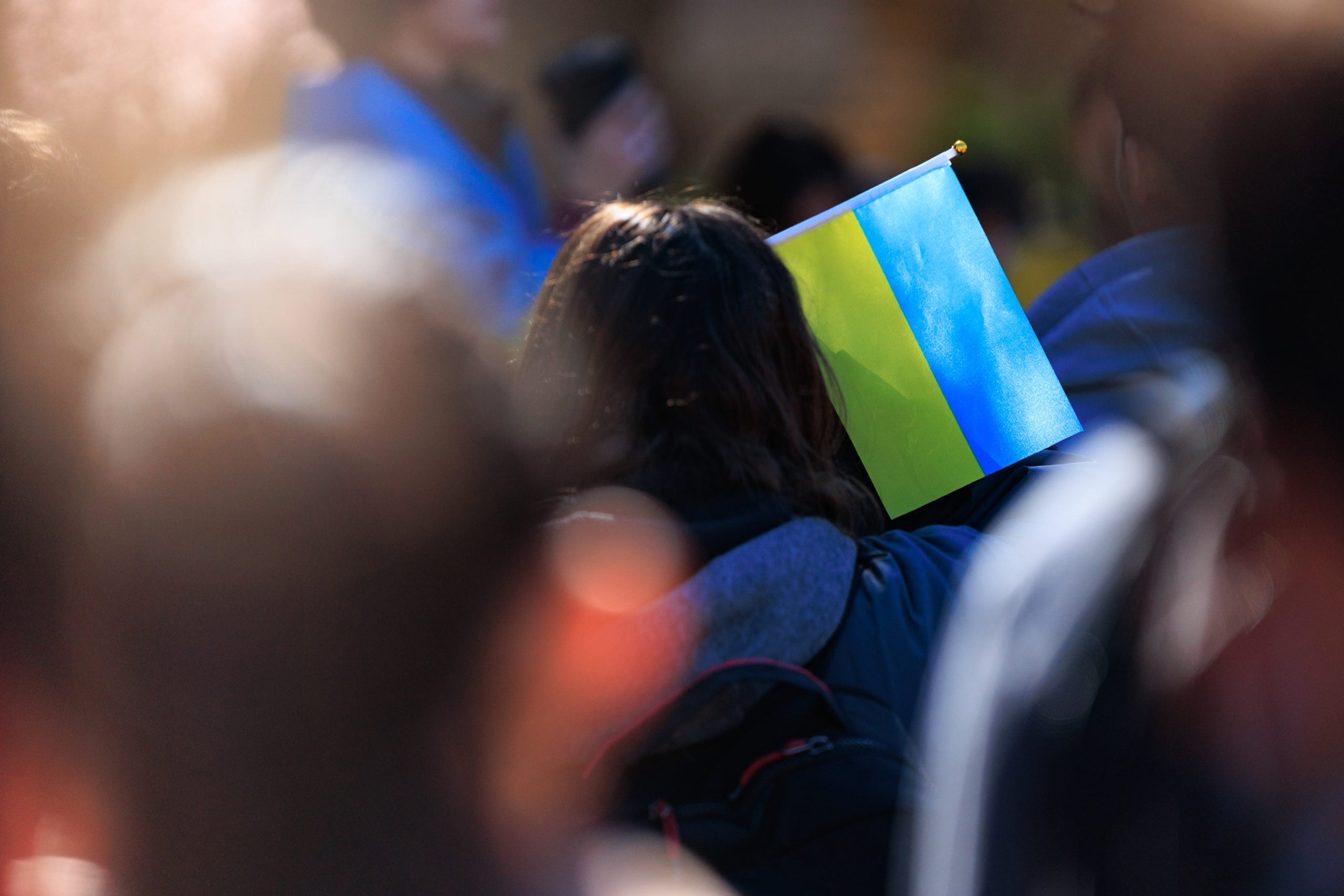For Daria Matviienko, a first-year economics Ph.D. student at the Graduate School of Business, Russia’s military invasion of neighboring Ukraine is more than a geopolitical conflict — it means the endangerment and potential loss of her loved ones back in Ukraine.
Matviienko was born in Donetsk, one of the two Russian separatist-held regions of eastern Ukraine where Putin first ordered troops. She and her parents have moved from town to town in Ukraine throughout the past decade in search of greater economic opportunity. Now, after finally finding a place to call home, Matviienko fears that her family may not have a safe place to go as violence and instability increase in Ukraine. Since Russia put boots on the ground in Ukraine, Matviienko has spent almost all her time on the phone calling her family in Ukraine.
“We have to move again, but we don’t have anywhere else, because it’s not safe in Ukraine,” Matviienko said. “My uncle has a newborn and I feel so worried.”
Early Thursday morning, the Russian military initiated a military assault on neighboring Ukraine. Since the invasion started, military vehicles have entered the country and explosions in civilian cities including Ukraine’s capital, Kyiv have been reported. As global leaders warn of more casualties and escalation, Stanford students with ties to the region fear for the safety of loved ones and the future of their country.
Many Ukrainian students have spent the past several days tracking news updates and staying in constant contact with friends, family and loved ones. “It’s terrifying to read the news and it’s impossible not to read the news,” said Kate Slunkova, MBA ’22 who comes from Ukraine and has family members in both Eastern Ukraine and Kyiv.
“This dual reality of being a student here, and trying to stay on top of things, and being informed about what’s happening back home — it’s been challenging,” Slunkova continued.
Opportunities for Ukrainian students to stop and assess the situation have been scarce in recent weeks — in a live Wednesday broadcast on Russian national television, Putin warned other nations that trying to interfere with Russian forces would “lead you to such consequences as you have never experienced in your history.”
“Just a month ago, we [were] discussing their plans to come to visit me during graduation,” Slunkova said about her parents and loved ones still in Ukraine. “This weekend, we are discussing whether the basement in their house has cellular connection, in case they would need to wait in the basement.”
“Everyone is in panic and in stress; the only thing to do is to find shelters,” Matviienko said, echoing Slunkova’s fears. “My mom was just collecting her things and she told me that she brought some blankets, some food and winter boots, just in case.”
According to Ukrainian President Volodymyr Zelensky, at least 137 Ukrainian soldiers have been killed and at least 300 wounded as of early Thursday.
“Both sides will be affected a lot in the Ukrainian population and Russian population, and I’m really afraid that there will be thousands of lives taken,” Matviienko said.
The invasion’s on-campus impact has not been limited to Ukrainian students — Dmitry Skvortsov ’25, an international student from Russia, said he fears a collapse of the global currency value of rubles and visa issues as an international student in the United States.
“I am afraid that if I leave the U.S. now, I cannot obtain a U.S. visa again,” Skvortsov said. “I do not know what to expect.”
Concerns about a potential invasion reignited in March 2021 when Putin ordered the largest mobilization near the Ukrainian border since the 2014 annexation of Crimea. As tensions intensified in recent weeks, several Stanford students helped organize “Stand With Ukraine” rallies in San Francisco to muster public support as fears of war grew.
Ukrainian student Andrii Torchylo ’25 said that the international community has an obligation to support Ukraine. He referenced the 1994 Budapest Memorandum, which legally bound countries such as the U.S. and Britain to intervene in military conflict in order to maintain Ukrainian sovereignty.
“Everything Ukraine could possibly do, we already did,” Torchylo said. “It’s not a question of what Ukraine can do or not do now. It’s a question of how other countries can respond to the crisis in eastern Ukraine.”
Although the U.S. has not deployed ground troops in Ukraine, President Joe Biden promised that the U.S. and its partners “will respond in a united and decisive way,” in a statement released by the White House on Feb. 23. As of now, the U.S. and its allies have taken a number of economic measures, including cutting off global financing to two major Russian banks and instituting a new array of sanctions in light of the assault.
Torchylo stressed Ukraine’s importance as “the only symbol of democracy in the post-Soviet region.”
A Russian takeover of Ukraine, he worries, could lead to the post-Soviet region falling to Putin’s regime.
“If there will be no more democracy in the post-Soviet region, then there is no point in protecting democracy in the world,” Torchylo said.
In the face of the hardships accompanying Russia’s invasion, Ukrainian students on campus are working to bring their community together. On Thursday, students gathered in Main Quad for an event titled, “Stanford Stands With Ukraine.” Protesters at the rally called for allyship from the Stanford community, including support for Ukrainian armed forces after the National Bank of Ukraine opened a special fundraising account.
Additionally, Ukrainian students at Stanford are planning to start a Ukrainian Stanford Students’ Association to educate students of all backgrounds “on how beautiful Ukrainian culture is,” Slunkova said.
